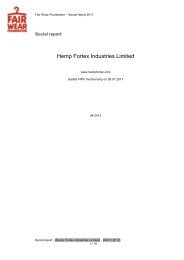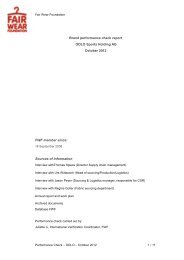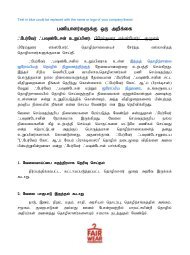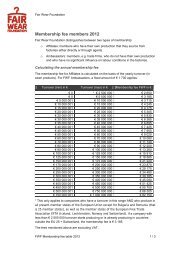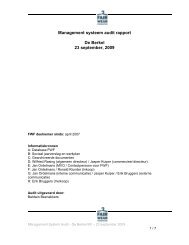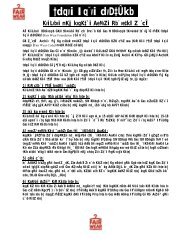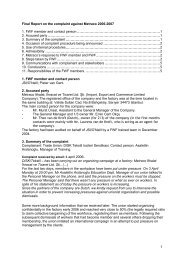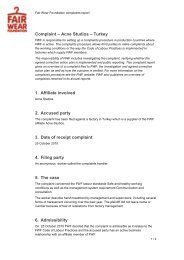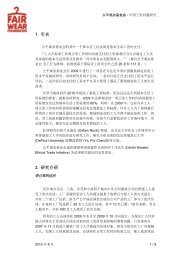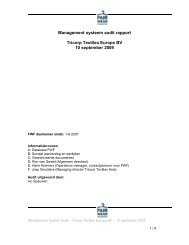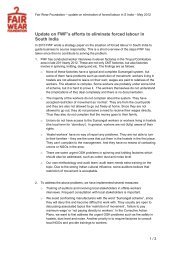Background Study Tirupur - Fair Wear Foundation
Background Study Tirupur - Fair Wear Foundation
Background Study Tirupur - Fair Wear Foundation
You also want an ePaper? Increase the reach of your titles
YUMPU automatically turns print PDFs into web optimized ePapers that Google loves.
leged corruption.<br />
In <strong>Tirupur</strong>, there is one Assistant Inspector of Factories, Inspector of Factories<br />
and one Deputy Chief Inspector of Factories. All the offices are located in Tiruppur.<br />
These Inspectors inspect the factories, verify whether labour standards are<br />
maintained, health and safety measures are followed and monitory benefits are given to the<br />
workers.<br />
“Even in those firms in Tiruppur which are in theory regulated (for example where they are<br />
registered with the Factories Inspectorate) the labour force is substantially unaffected, certainly<br />
as regards wage rates, and often as regards overall conditions of work. (…) The degree<br />
of co-ordination necessary to achieve any measure of success in attempting to pressure<br />
enterprises to conform totally undermines the task in hand. There was not only the Factories<br />
Inspectorate, but different Inspectorates for Employees State Insurance and for Provident<br />
Fund ; in addition, the Tiruppur Municipality had to grant a health and safety licence to which<br />
the Electricity Board had to agree. “ (Cawthorne). This description of the situation in the<br />
1980s does still seem to be valid.<br />
Deputy chief factory inspectors will only inspect licensed companies above a certain number<br />
employees. This inspection includes more safety aspects.<br />
Otherwise only assistants inspectors will make visits.<br />
Labour legislation is quite complicated. There are 200 odd central and state labour laws. Still<br />
almost 97 per cent of the country’s workforce remained in the unorganised sector. (Tribune<br />
news service sept. 8 2003).<br />
A major overhaul of labor legislation is on its way. “The long-awaited report of the Second<br />
Labour Commission had recommended, among other things, steps to check the multiplicity<br />
of trade unions, reduction in the number of holidays and empowering employers to lay off<br />
and retrench without prior permission.<br />
The commission, headed by Mr Virendra Verma, also sought a comprehensive legislation<br />
relating to working conditions at workplaces and another for the unorganised sector, besides<br />
asking the Centre to notify a national floor level minimum wage, giving the state powers to fix<br />
the minimum wage which should not be below the national level.” (Tribune news service<br />
sept. 8 2003).<br />
Uttar Pradesh and TN are introducing new laws that may allow contract labour in the garments<br />
export sector.<br />
3.6. Labour Laws And Acts<br />
The following overview is based on a report form UNIDO (http://www.unido.org/en/doc/4825).<br />
Most of the acts passed by the Government for the welfare of workers relate to the workers<br />
in the 'organized sector' of India's economy. A number of social security schemes have been<br />
established for them as well. Some acts and rules have also been framed for the nonorganized<br />
sector.<br />
Factories Act<br />
The Act aims to regulate working conditions in factories and ensures minimum standards of<br />
safety, health and welfare conditions of factory workers. The act also regulates the working<br />
hours, leave, holiday, overtime and employment of children, women and young persons. The<br />
Act was amended in 1987 to set out safeguards in respect to the handling of hazardous substances.<br />
The Act is worked out in Factories Rules, made on the level of the states.<br />
Working Hours<br />
The Factories Act Prescribes a 48 hour week for adult workers. In Offices a work week is<br />
generally considered to be 35 to 40 hours. Non-executive staff usually receive a shift allowance<br />
if they work in shifts that differ from the usual working hours.<br />
Paid Holidays<br />
These are generally between 10 to 20 paid public holidays in a year, for factories and offices<br />
21




